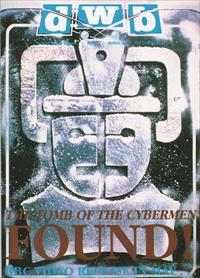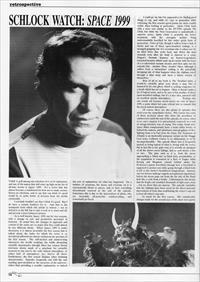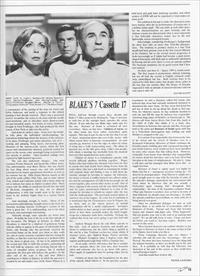Schlock Watch Space 1999
DWB Issue 99, March 1992, p14-15
DWB started life as Doctor Who Bulletin in 1983. Like other fanzines in the 1980s it became more professional in look and writing over the years, and although heavily focussed on Doctor Who it expanded its scope to other series. The fanzine was heavily news and review based, with strong critical opinions. In 1994 it was relaunched as a professional magazine, Dreamwatch (1999 coverage included two interviews by Steve Eramo in 1995, Barry Morse and Nick Tate, and a Marcus Berkmann column in 1997). Dreamwatch was acquired by Titan magazines in 2001, and eventually folded in 2007.
As the ITC videos of Space: 1999 were released from 1992-1994, DWB ran video reviews from Anthony McKay and Andrew Pixley. In early 1992 the regular retrospective feature Schlock Watch covered Space: 1999.



Take a poll among any selection of tv sci-fi enthusiasts, and one of the names that will come up high on the list of all-time worsts is Space: 1999. It's a series that has almost become a watchword for how not to make science fiction on television, and to say that you think it's good would be to invite howls of derision from the media community.
I certainly wouldn't say that I think it's good. But I do have a certain fondness for it. And that is the standpoint from which this article is written not to defend it to the hilt but to take a look at it, warts and all, and present a more balanced picture.
As is well known, Space: 1999 ran for two seasons, with a change in cast and production personnel in between. In actual fact, the changes in approach and content of the series are so major that they could almost be two different shows. When Space: 1999 is under discussion, it is almost invariably the first season that is talked about; the faults for which the series is so mercilessly pilloried are almost exclusively the province of the first season. The stiff-necked and uninteresting characters; the woolly scripting; the wildly abounding scientific inaccuracies (though when has science fiction television shown much of a penchant for scientific accuracy in any case?); the cold, clinical atmosphere, Or rather lack of atmosphere; yes, they're all there. Furthermore, the first season displays Other irritating characteristics. Episodes frequently end with the cast standing open-mouthed at 'the mysteries of the universe', rather than providing a sensible explanation, or indeed any sort of explanation, for what has happened. On a number of occasions, the moon and everyone on it is systematically blown to pieces, only to have everything miraculously restored at the end of the episode. Sometimes this is due to the intervention of aliens, who are invariably all-powerful, condescending, and remarkably po-faced.
I could go on, but I'm supposed to be finding good things to say, and while it's easy to generalise while criticising, the first season's good points are more readily visible when looking at particulars. Alpha Child deals with a story very similar to the ST:TNG episode The Child, but while the Next Generation is undoubtedly a superior series, Alpha Child is probably the better treatment, with the surrogate mother being understandably horrified by this rather grisly form of possession. Force of Life, though it suffers from a lack of clarity and one of those open-mouthed endings, is a strangely gripping tale of a crewman who is taken over by an alien force that seeks heat, and drives the man onwards even after his body is charred to a crisp. Dragon's Domain features an honest-to-goodness tentacled monster which sucks up its victim with the force of a tv-advertised vacuum cleaner, and then spits out the crunchy bits. Another Time, Another Place, although it suffers from a 'miraculous' ending, is the potentially intriguing tale of what happens when the Alphans travel through a time warp and meet a future version of themselves.
Best of all in my book is The Troubled Spirit, a would-be scientific ghost story about a man who is haunted by his own ghost, which is seeking vengeance for a death which has yet to happen. Okay, it doesn't make a lot of logical sense, and to be sure it has another of those open-mouthed endings, but it's a nice idea, pursued with an excellent spooky atmosphere. Perhaps this one stands out because mood pieces are rare in Space: 1999, a point which led some critical wits to remark that the moon lacked atmosphere.
Of course, there are also plenty of episodes that resist even the sympathetic viewer. War Games has some of those po-faced aliens who blow the moonbase to smithereens (until the end of the episode, of course, when to no one's surprise it is miraculously restored) in a sort of energy-intensive way of saying 'Not. today, thank-you'; Space Brain conspicuously lacks a brain either before or behind the camera, and substitutes instead gallons of fire- fighting foam a la Fun from the Deep; The Testament of Arkadia is an intolerably pompous variant on the Shaggy God story, Collision Course is so obfuscatory as to be incomprehensible. The episode Black Sun is frequently quoted as being typical of what is wrong with the series, but in fact this is not quite true; it is actually an amalgam of all the show's worst failings, and as such merits a line or two. The plot, such as it is, finds the moon approaching a 'black sun' (a black hole, presumably), so the population is evacuated in a fleet of Eagles while Koenig and Bergman remain behind under the Professor's patent forcefield (though how a forcefield is supposed to protect you while going through a black hole is left to the viewer's bewildered imagination). Anyway, our two heroes undergo vaguely metaphysical experiences before the moon pops out from the far side of the black hole like a cork from a bottle. Unfortunately this means that the Eagles are stranded thousands of light years away ... but no, there they are anyway. The episode concludes that the Alphans have been saved by the direct personal intervention of God, thus establishing the writer's cop-out to beat all writer's cop-outs.
So much for the first season. The considerable changes made for the second year of the show were partly a consequence of the parting of the ways for Gerry and Sylvia Anderson, and partly a response to the critical panning it had already received. There was a perceived need to streamline the series, to do away with the woolly quasi-mysticism, and to introduce more down-to-earth (no pun intended) action. For better or worse, Anderson brought in Fred Freiberger, who had produced the third season of Star Trek, to take over the series.
And down to earth it came. Gone were the would- be lofty plots, the half-baked intellectualising, the sententious mutterings about the mystery of the universe. In its place, Freiberger put action adventure, lots of it running and jumping, firing lasers, fast-moving plots. Monsters of the man-in-a-suit variety, which the first season had ostentatiously shunned, positively jostled for space on the screen, some amusingly being recycled from one episode to another. Open-mouthed endings were replaced by light-hearted tag scenes.
The cast also underwent changes. Out went truculent Prentis Hancock and Spock-like Clifton Jones. Out, unfortunately, went Barry Morse, who was clearly the best thing about season one, and who probably remembered an urgent appointment elsewhere as soon as his contract was up. Elfin Zienia Merton stayed, as did salt-of-the-earth cobber Nick Tate, and in came cheery Tony Anholt and Catherine Schell, with a funny make-up job to indicate her status as Alpha's resident alien. Maya comes with the ability to transform herself into any kind of life-form, irrespective of size, sex or physical configuration, a trick that would seem to be more at home in the Arabian Nights than in a science fiction series.
And amazingly enough, it works. Shorn of the pretentious philosophising, brought down to the level of a Saturday morning cartoon, Freiberger's version of the show is great fun. It is undemanding, not to be taken seriously, and surprisingly entertaining.
Naturally enough, some episodes are better than others. probably the best of the lot is the first episode of the two-parter The Bringers of Wonder, in which the Moonbase is visited by a shipload of gelatinous beings with the ability to appear in the guise of old friends from Earth; only Koenig, who has previously received the proverbial bump on the head, sees them as they really are, and of course everyone concludes that he's losing his marbles, so that he's soon tied down on a medical trolley for the aliens to gloop over. (It has to be admitted that the second part fails to fulfil this promise, jettisoning all the well built-up suspense and resolving instead into a series of extended action set-pieces, but if watched separately, the first part still delivers the goods.) At the other end of the scale is Pip and Jane Baker's contribution, A Matter of Balance, in which the universe is invaded by an anti-matter race (well, Stuart Wilson in a bald head and gold lame jockstrap actually), and which readers of DWB will not be surprised to learn makes no sense at all.
The publicised attempt to make the characters seem more human, after the icy performances of season one, is a definite damp squib. The cast smile at each other more, but the characterisations are pure formula, and the Alphans remain two-dimensional; what is more important is that believable characters matter less in the new lightweight, action-orientated format.
Interestingly, considering Freiberger's background, the show does take on more Star Trek-like characteristics. The tendency to produce stories in a Star Trek mould had been present even in the first season (Mission of the Darians), but as the second season progresses, it looks increasingly as if Alpha had become a giant moon- shaped Enterprise with Kirk and co arbitrarily substituted by Koenig and his crew, there is even an episode entitled The Immunity Syndrome, for no good reason that I have ever noticed.
So there you have it Space: 1999 is worth revisiting. The first season is prententious, clinical, irritating, but not all bad; the second is brightly coloured comic strip, unintelligent but fun. Both versions have to be enjoyed for their flaws rather that despite them, rather in the way that one watches films like House of Dracula. Approach it with an attitude of amused tolerance and you may enjoy it after all.
David Scott
Space: 1999 copyright ITV Studios Global Entertainment